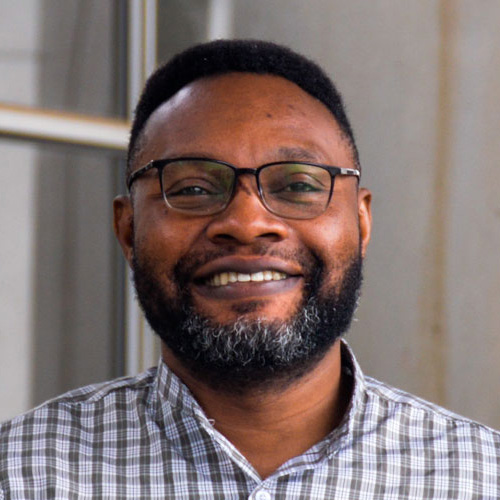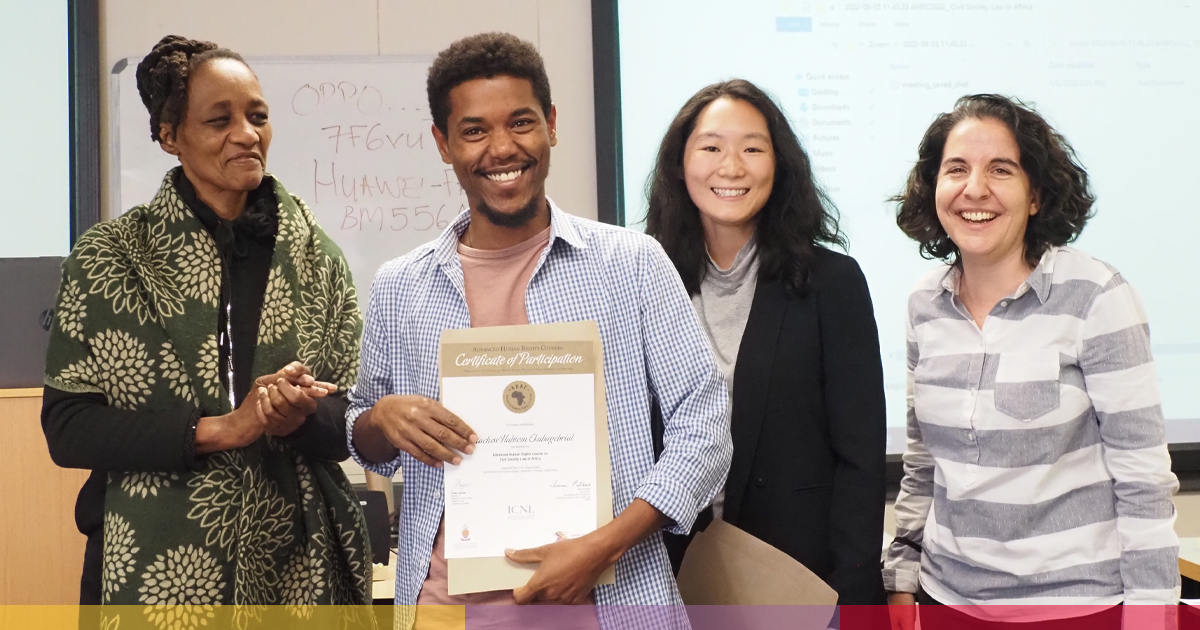The Centre for Human Rights (CHR), University of Pretoria (UP), in collaboration with the International Center for Not-For-Profit law (ICNL) hosted its annual advanced human rights course on “Civil Society Law in Africa” at University of Pretoria. This year’s course was held in a hybrid format, about twenty participants from Southern and East African regions attended the course physically at the University, while about fifty attended online from other different parts of Africa. The participants included students, several civil society organizations representatives, legal practitioners, human rights advocates, members of government institutions, members of parliament, members of the judiciary and representatives of law enforcement agencies.
The course started with a word of welcome and setting of the course scene by Dr Nkatha Murungi, Assistant Director, Centre for Human Rights, who also acknowledged the continued partnership between the CHR and ICNL and the representatives Ms Irene Petras, and Ms Lily Liu, Legal Advisors at ICNL, and the course coordinators, who were both physically present in Pretoria.
The course then began with the first presentation by Siphosami Malunga, Director of Programs, Open Society Foundations, Africa, on the topic “Understanding the Evolution and Role of African Civil Society, is the Sector Fit for Purpose?” The introduction looked at the meaning of civil society, thus it connotes different ideologies, and diverse concepts and as such must be dealt with, in its diversity. He further stated that adaptation mechanisms must be sought to expand the shrinking space placed on the roles of CSOs.
The second activity for the day was an interactive exercise by participants on the “Legal Framework for Civil Society, why do they matter? The exercise was conducted through Mentimeter, where answers to several questions regarding this topic were given by participants. In moderating this session, Irene Petras, Senior Legal Advisor -Africa, International Center for Not-for-Profit Law (ICNL) explained that indeed the civil society space globally is shrinking, and governments are using a range of restrictive laws to clamp down on the activities of CSOs. She further stated that these restrictions worsened during the COVID 19 era.
The afternoon session continued with a presentation by Lily Liu, Legal Advisor, ICNL on the topic “International Law and the Freedom of Association” which included principles, roles, importance, legal frameworks, barriers, and limitations of freedom of association. Another interactive session by participants on the topic “National Legislation and Freedom of Association: A trip around the globe” wrapped up the program for day one (1) and participants had the opportunity to make contributions based on their country’s position and present legal framework.
The second day’s program started with a class exercise with participants responding to what they would do to or about restrictive laws. Dr. Thomas Probert (Freedom from Violence Program, Center for Human Rights) thereafter began discussions on the topic “Civil Society and the Right to Assembly”. He looked at the key points, state obligations, restrictions, and organizer responsibilities of the right to freedom of assembly. Louise Edwards (Director of Program and Research, APCOF) continued the morning session with a presentation on the topic “Policing of Assemblies in Africa: How well are States Faring?” She considered the topic from two angles; what we are doing as a region and what we are doing as countries.
The afternoon session for day two (2) continued with a class exercise, where participants were given a practical hypothetical scenario and asked what measures would be applicable, considering the ACHPR Guidelines for the Policing of Assemblies by Law Enforcement Officials in Africa and the Guidelines of Freedom of Association and Peaceful Assemblies in Africa and the Guidelines in Freedom of Association and Peaceful Assemblies in Africa to Restrictive Laws and Practices. Afterward, there was a Q&A on the topic “Freedom of Assembly, topical issues, key trends and case studies across Africa” moderated by Stanley Nyamanhindi (SADC Lawyers Association) with practical situations explained by panelists: Jane Muhia (Kenya, Free to Protest Campaign), Patrick Allam (Spaces for Change, Nigeria #EndSARS) Sheryll Dass (Legal Resource Center, South Africa) and Pastor Evan Mawarire (This Flag, Zimbabwe).
Andrew Firmin (Editor-in-Chief, CIVICUS) and Francesca Fanucci (Senior Legal Adviser, ECNL) kicked off the third day’s program with the topic “Monitoring Freedom of Assembly” which included the question of what the “Covid-19 Civic Freedom Tracker” is, how it was developed, regional trends, regional priorities, findings, achievements and the proposal of an evidence-based solution to challenges.
Lily Liu, (Legal Advisor, ICNL) thereafter presented on the topic “Civil Society and the Freedom of Expression”, the importance, relevant framework, scope, limitations, common restrictions on freedom of expression, prohibited speech and hate speech. The day continued with a look at “Digital technology and Freedom of Association, Assembly and Expression: Contemporary Challenges and Opportunities for Civil Society in the Digital Age” presented by Shabnam Mojtahedi (ICNL Legal Advisor, Digital Rights). Some of the issues covered under this topic definition are applicable legislation for internet law, the standard legislation which includes UDHR, ICCPR and ACHPR, violations of these rights by individuals, and consequences and government restrictions. Day three (3) came to an end after a group exercise by participants responding to restrictive laws that impact digital rights moderated by Hlengiwe Dube (Project Manager, Expression, Information, and Digital Rights, Center for Human Rights).
Day Four (4) began with a panel discussion on Protecting Civic Space at the Regional and Sub Regional levels: Lessons Learned from Strategic Litigation Initiatives” the panelist were, Anneke Meerkotter (Executive Director, Southern Africa Litigation Centre, Arthur Nsereko (Coordinator-NEPTIL, Uganda), Roselyn Hanzi (Executive Director, Zimbabwe Lawyers for Human Rights) and Ikechukwu Uzoma, (Africa Staff Attorney, International Advocacy and Litigation, RFK Human Rights). “The discussions were centered around factors that affect domestic litigation, complimentary interventions to strategic litigation, engaging special mechanisms and the fact that defending CSOs is a collective responsibility.
The above was followed by another panel discussion on the “Emerging Trends in Civic Space, Civic Society and Counterterrorism presented by Vanja Scoric (Program Director, ECNL) and Roselyn Hanzi (Executive Director, Zimbabwe Lawyers for Human Rights). Finally, the day concluded with interactive discussions on “Emerging Trends in the Civic Space, Freedom of Association and Assembly in the Contemporary Era” presented by Clement Nyaletsossi Voule (United Nations Special Rapporteur on the Right to Peaceful Assembly and of Association), moderated by Collette Letlojane (HURISA) and Irene Petras (ICNL). The take home for the day was the need for a cross-sectorial approach and the fact that guidelines are available but human rights are still being violated.
The course was concluded on the 5th day with the first presentation by Deprose Muchena (Amnesty International Regional Director) on the “Future of Civic Space of Africa- What next for civil society in Africa. The discussion revolved around defending civic space, the pillars of civic space, the authoritarian’s playbook, what must be done and how civil societies can win. This was followed by an interactive session on identifying opportunities to advance civic space at the country and continental levels moderated by Corlette Letlojane, Irene Petras and Lily Liu.
In conclusion, it was agreed by all the presenters and participants that the protection and promotion of the civic space is the responsibility of all individuals, a precondition for good governance and inclusive growth which aids in the efficient open government policies and stakeholder participation initiatives. We continue to thank ICNL for its continued partnership and financial support.
For more information, please contact:
Tel: +27 (0) 12 420 4197 Tel: +27 (0) 12 420 6398
Fax: +27 (0) 86 580 5743
dennis.antwi@up.ac.za
Fax: +27 (0) 86 580 5743
basimanyane.k@up.ac.za


